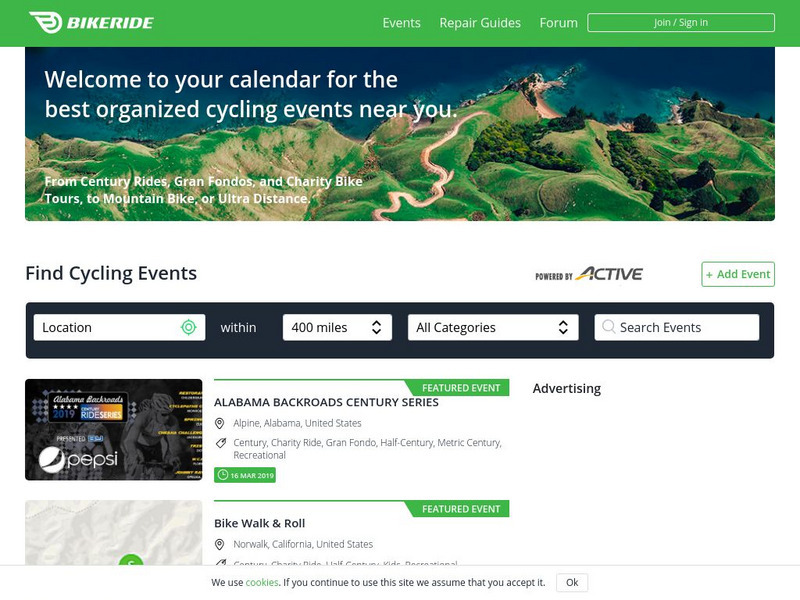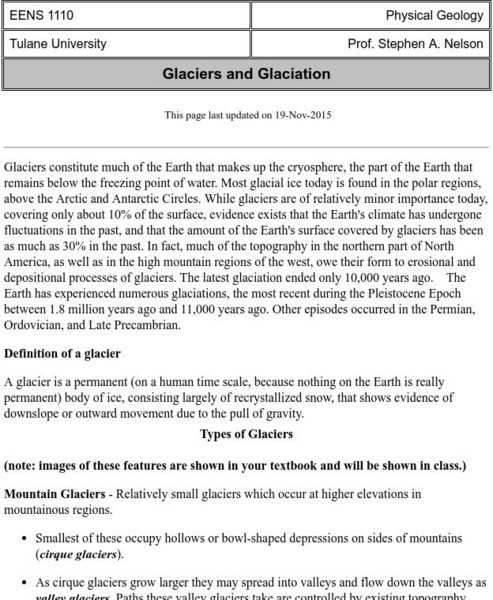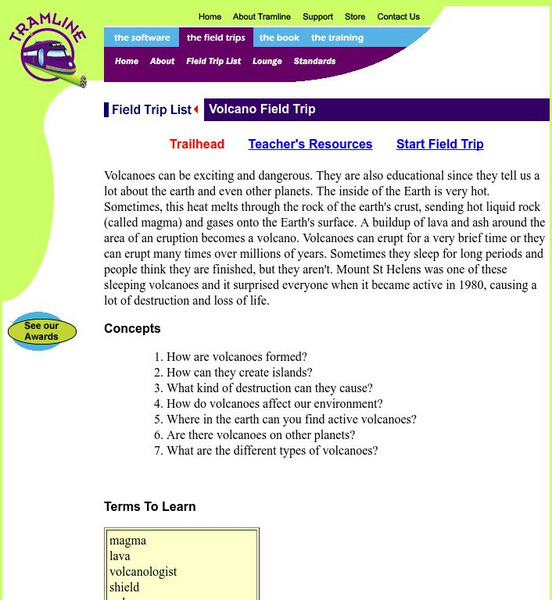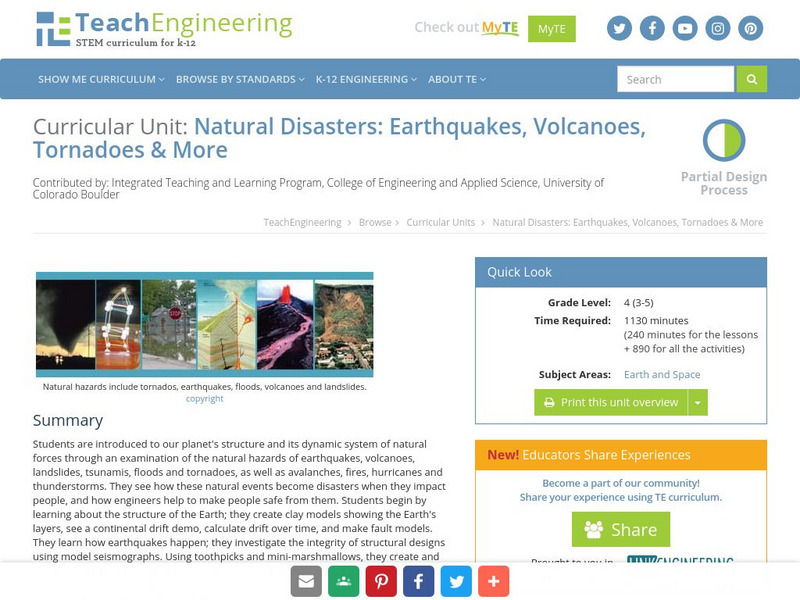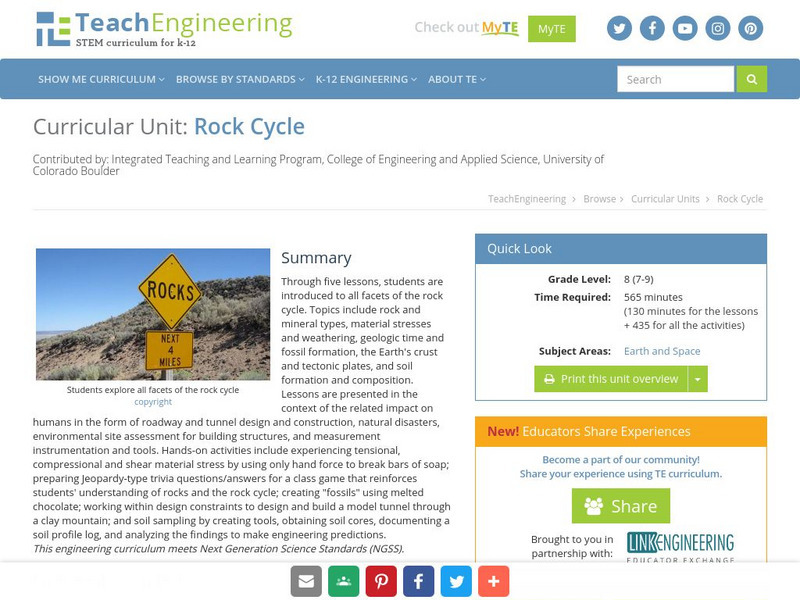PBS
Mountain Maker Earth Shaker
This resource gives an introduction to the theory of plate tectonics. It also has animations of four types of plate boundary interactions (convergent, divergent, transforming, collisional).
Other
Bike ride.com: Bicycling Events Calendar
This resource lists cycling events for the entire U.S. and Canada. There is a searchable database that allows you to put in the city you want and how many miles away you are willing to travel for all types of cycling events.
Other
Tulane University: Physical Geology: Glaciers and Glaciation
Lots of information here about glaciation, types of glaciers, the formation of glacial ice, changes in glacier size, how glaciers move, glacial erosion, landforms produced by glaciers, glacial deposition and drift, effects of glaciation...
National Snow and Ice Data Center
National Snow and Ice Data Center: Glacier Gallery
This website has a variety of photos that show types of glaciers and their effects. There are also links to other sites that contain glacier photos.
Tramline
Virtual Field Trip: Volcanoes
In this virtual field trip find out about how volcanoes are formed and what kind of destruction can they cause. Discover how volcanoes affect our environment and where can you find active volcanoes on earth and on other planets.
Other
Outdoor Life: Where to Hunt: Guide to the 8 Best Big Game Hunts in the West
Presents information on high quality hunts for big game across the United States. Looks at popularity of the hunt, type of terrain, difficulty level, trophy potential, places to stay, and cost for licenses and tags.
eSchool Today
E School Today: Your Cool Facts and Tips on Wind
Learn all about wind, what it is, words used to describe wind, the different types, the coriolis effect, different types of breezes, and how wind is measured.
PBS
Pbs Learning Media: Earth's Systems: Map It
Explore different types of maps and how different things are represented on maps in this media gallery from WGBH. Maps are used to help locate different places and different things. Map symbols are representations of larger things in the...
BBC
Bbc News: Science and Environment: How Earthquakes Happen
This site uses a series of animations to give an overview of earthquake types and their causes. This colorful site is accompanied by brief descriptions. Additional animations of other natural disasters are featured on the right side of...
Other
Ancient Mysteries: Gobi Desert Mysteries
This site details information about the mysteries of the Gobi Desert, an area actually comprised more of mountains than desert. This site has a map of the Gobi area, photos of the Gobi, as well as links to information about ancient...
International Olympic Committee
International Olympic Committee: Cycling Bmx
Learn about different types of bikes for various cycling events (the cycling track events, the off-road cycling events) through colorful drawings, animations, and simple descriptions. Also, learn the difference between women's events and...
CK-12 Foundation
Ck 12: Fourth Grade Science: Earth Science: Theory of Plate Tectonics
[Free Registration/Login may be required to access all resource tools.] Discusses what a tectonic plate is and how scientists can recognize its edges, how the plates move by convection in the mantle, the three types of plate boundaries...
CK-12 Foundation
Ck 12: Earth Science: Geographical Determinants of Climate Study Guide
[Free Registration/Login may be required to access all resource tools.] Summarizes the key processes that determine the type of climate. Includes several questions to check for understanding.
Math Science Nucleus
Math/science Nucleus: Observing Different Landforms
Lesson plan with subsequent pages to use with the instructional activity. Images with landform word match up and additional work on earth modeling.
Center for Educational Technologies
Nasa Classroom of the Future: Volcanoes
Use this site to discover some interesting facts about volcanoes and how they affect the earth. See some great animation and photos of volcanoes as well.
Other
Joseph Wu Origami: What Is Origami?
A brief history of the art of Origami by Joseph Wu. Basic techniques, types of paper, and terminology are discussed.
Other
Montana State University: Plate Tectonics and Glacier Formation [Pdf]
Document describes the two types of glaciers and how they are formed. Learn how plate tectonics and glacial formation are related.
Computer History Museum
Computer History Museum: Abacus
The Computer History Museum located in Mountain View, California, provides a glimpse into the development of the information age via their large collection of artifacts. This section highlights the development and use of the abacus, "a...
Science Struck
Science Struck: Landforms in Tropical Rainforests
Describes five types of landforms found in a tropical rainforest.
Mocomi & Anibrain Digital Technologies
Mocomi: Major Biomes of the World
Covers the major types of biomes: tropical rain forest, arctic tundra, coniferous forest, deciduous forest, desert, grasslands, and mountains.
Other
Gorp: Using Clouds to Forecast the Weather
This resource provides information on the four main types of clouds that form in the atmosphere. There are high clouds, middle clouds, low clouds and clouds with vertical development.
TeachEngineering
Teach Engineering: Natural Disasters
Students are introduced to our planet's structure and its dynamic system of natural forces through an examination of the natural hazards of earthquakes, volcanoes, landslides, tsunamis, floods and tornados, as well as avalanches, fires,...
TeachEngineering
Teach Engineering: Rock Cycle
Through five lessons, students are introduced to all facets of the rock cycle. Topics include rock and mineral types, material stresses and weathering, geologic time and fossil formation, the Earth's crust and tectonic plates, and soil...
Other
Bringing History Home: Environmental History
This 2nd grade unit introduces children to the history of environmental protection in the U.S. Beginning with three types of environment - mountain, grass plain and forest - the lessons explore some of the natural resources found in...



